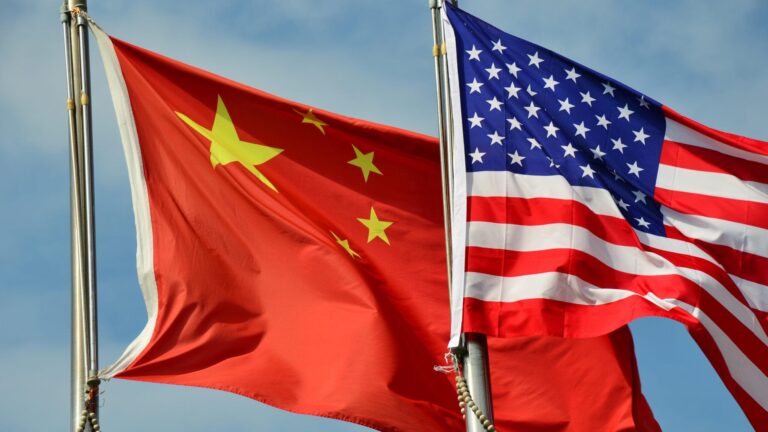Speaker Johnson has accused China of exacerbating tensions with the United States through its recent restrictions targeting Nvidia, one of America’s leading semiconductor companies. In a statement reported by CNBC, Johnson warned that Beijing’s chip ban is contributing to a growing strain in bilateral relations amid an already fraught landscape of trade and technology disputes. The move marks a significant escalation in the ongoing rivalry between the two global powers over critical technology sectors.
Speaker Johnson criticizes China’s actions for escalating tensions with U.S. over Nvidia chip export restrictions
Speaker Johnson expressed concern over China’s recent moves, accusing Beijing of intentionally heightening geopolitical tensions by retaliating against the U.S. with measures tied to Nvidia’s chip exports. The restrictions on advanced semiconductor technology not only threaten the competitive edge of American tech firms but also risk destabilizing a crucial axis in global supply chains. Johnson emphasized that such actions could provoke a broader confrontation, undermining efforts to maintain a balanced and constructive U.S.-China relationship.
Highlighting the ramifications for industry and national security, Johnson outlined key points on how the situation impacts multiple fronts:
- Technological dominance: The restrictions challenge American leadership in AI and high-performance computing.
- Economic consequences: Potential disruptions in trade and collaboration within the semiconductor ecosystem.
- Strategic posture: Possible acceleration of policy measures to counteract China’s aggressive stance.
| Aspect | Impact | Potential Outcome |
|---|---|---|
| Export Restrictions | Supply chain bottlenecks | Reduced market share for U.S. firms |
| Diplomatic Relations | Heightened tensions | Stricter trade policies |
| National Security | Vulnerabilities in tech infrastructure | Increased domestic investment |
Implications of the Nvidia chip ban on U.S.-China technology supply chains and national security
The recent restrictions on Nvidia’s chip exports to China mark a significant shift in the technology supply chain dynamics between the U.S. and China. These limitations not only disrupt the seamless flow of advanced semiconductor components but also highlight broader strategic efforts to curb China’s technological advancements. Industry experts warn that the ban could accelerate China’s push toward achieving semiconductor self-sufficiency, forcing American companies to rethink their global manufacturing and sourcing strategies. Key challenges include:
- Increased supply chain fragmentation and uncertainty
- Potential delays in the development of cutting-edge AI and data center technologies
- Heightened costs due to rerouting production and finding alternative suppliers
Beyond economic ramifications, national security concerns are front and center. Lawmakers like Speaker Johnson argue the ban is vital to preventing critical U.S. technologies from enhancing China’s military capabilities. The move sets a precedent for future export controls and raises questions about the long-term resilience of U.S. technological dominance. The interplay between safeguarding sensitive technologies and maintaining international trade relationships remains a delicate balancing act, with potential ripple effects impacting global tech ecosystems for years to come.
| Impact Area | U.S. | China |
|---|---|---|
| Supply Chain Stability | Disrupted, pushing diversification | Accelerated localization efforts |
| Tech Innovation | Short-term slowdowns possible | Increased investment in R&D |
| National Security | Enhanced control over exports | Potential military tech advancements |
Strategic recommendations for navigating semiconductor trade challenges amid mounting geopolitical pressures
In light of escalating geopolitical tensions and recent restrictions on semiconductor exports such as Nvidia’s advanced chips, companies and policymakers must adopt a multi-faceted approach to sustain technological competitiveness. Prioritizing supply chain diversification stands paramount; businesses are advised to expand manufacturing operations beyond traditional hubs to reduce dependency on any single nation. Additionally, fostering partnerships with allied countries can create resilient networks capable of weathering political disruptions. Equally important is investing in domestic R&D to reduce reliance on foreign technologies, promoting innovation that aligns with national security interests.
Strategic measures essential for industry stability include:
- Strengthening export control frameworks to ensure compliance while enabling strategic trade.
- Collaborating across governments and private sectors to share intelligence and forecast supply risks.
- Incentivizing local semiconductor manufacturing with tax credits and infrastructure support.
- Leveraging emerging markets to diversify production and reduce geopolitical bottlenecks.
| Challenge | Recommended Action |
|---|---|
| Export restrictions | Develop alternative supply sources and domestic plants |
| Technological espionage risks | Enhance cybersecurity and IP protection measures |
| Supply chain disruptions | Build inventory buffers and regional stockpiles |
Closing Remarks
As tensions between the U.S. and China continue to escalate over technology and trade, Speaker Johnson’s remarks underscore the growing complexities in maintaining bilateral relations amid strategic competition. The Nvidia chip ban represents a critical flashpoint, highlighting how economic policies increasingly intersect with national security concerns. Observers will be watching closely to see how both nations navigate this turbulent landscape and what implications it may hold for the global technology sector moving forward.




